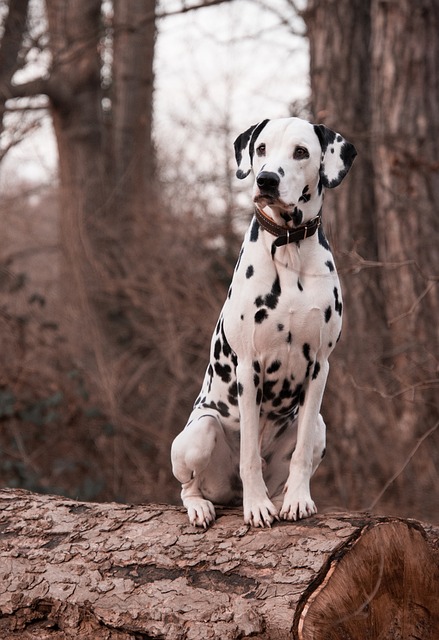


The Dalmatian is a distinct and energetic breed known for its unique spotted coat and lively personality. Originally bred as a carriage dog, Dalmatians are known for their endurance, intelligence, and playful nature. They are highly recognizable because of their striking black or liver-colored spots on a white coat. Dalmatians make excellent companions for active families, as they thrive on exercise and interaction. Despite their independent nature, they are affectionate, loyal, and can be great family pets when given the right environment and training.
The Dalmatian is one of the oldest dog breeds, with origins dating back hundreds of years. Their history is somewhat unclear, but they are believed to have been used as carriage dogs, firehouse mascots, and even war dogs. The breed's name comes from the Dalmatia region, located in modern-day Croatia, where they were first documented. Dalmatians were often used to guard horse-drawn carriages and to run alongside them, protecting the horses and their owners. The breed was also used by firehouses in the 19th century, where they would run ahead of the fire trucks to clear the path. The Dalmatian gained widespread popularity in the 20th century, largely due to their role in the Disney movie *101 Dalmatians*.
The Dalmatian is a medium-sized dog with a sleek, athletic build. Adult males typically weigh between 50 to 60 pounds, while females are slightly lighter, weighing 40 to 50 pounds. They stand around 19 to 24 inches tall at the shoulder. The breed is most famous for its coat, which is short, dense, and covered in distinct black or liver-colored spots. These spots are present from birth but may change or develop as the dog grows. Dalmatians have a well-proportioned, muscular body with a deep chest and long legs. Their ears are set high, and their eyes are typically dark, expressing a lively and alert personality. The Dalmatian's tail is long and carried in a slight curve.
Dalmatians are known for their high energy, intelligence, and outgoing nature. They are often described as lively, playful, and sometimes even mischievous. Dalmatians are independent and confident dogs, which can sometimes make training a challenge. They can be reserved or aloof with strangers but are typically very affectionate with their families. Early socialization and consistent training are important to ensure they develop into well-behaved, friendly dogs. Dalmatians are generally good with children and other pets, though their high energy can sometimes be overwhelming for young children or smaller animals. They can also have a strong protective instinct, making them good watchdogs.
Dalmatians are highly active dogs that require plenty of exercise to stay healthy and happy. They were originally bred to run alongside carriages, so they have a natural inclination for endurance and high-energy activities. Daily exercise is a must, including long walks, runs, and opportunities to play in a secure, fenced yard. Dalmatians enjoy interactive games such as fetch, and they excel in dog sports like agility and obedience competitions. Without sufficient exercise, Dalmatians may become bored and develop behavioral problems, such as excessive barking or destructive chewing. They do well in active households where they can participate in various activities.
Training a Dalmatian can be both rewarding and challenging. Dalmatians are intelligent dogs, but they are also independent and sometimes stubborn, which can make training difficult for inexperienced owners. Positive reinforcement techniques, such as using treats and praise, work best for motivating a Dalmatian. Early socialization is important to help them develop into well-rounded dogs that are comfortable with different people, animals, and environments. Consistent training, firm leadership, and plenty of patience are essential for raising a well-behaved Dalmatian. Without proper training, Dalmatians can become overly dominant or unruly, which can lead to behavioral issues.
Dalmatians are generally a healthy breed, but they can be prone to certain health conditions, such as deafness, hip dysplasia, and urinary stones. Deafness is particularly common in Dalmatians, and it is important to have their hearing checked regularly. They also have a predisposition to developing urinary stones, so maintaining a proper diet and hydration is essential for their health. Regular veterinary check-ups are crucial to monitor for potential health issues. Dalmatians' short coat is relatively low-maintenance, but they do shed, especially during shedding seasons. Regular brushing can help reduce shedding and keep their coat healthy. Dalmatians are also prone to sunburn due to their short, white coat, so it’s important to protect them from excessive sun exposure.
The average lifespan of a Dalmatian is around 10 to 13 years. With proper care, including a healthy diet, regular exercise, and routine veterinary check-ups, many Dalmatians live to the higher end of this range. Maintaining their health is especially important due to the breed's predisposition to certain health conditions. Regular monitoring of their hearing and urinary health is key to ensuring a long and happy life.
© copyright Dog Compendium 2024 - 2026